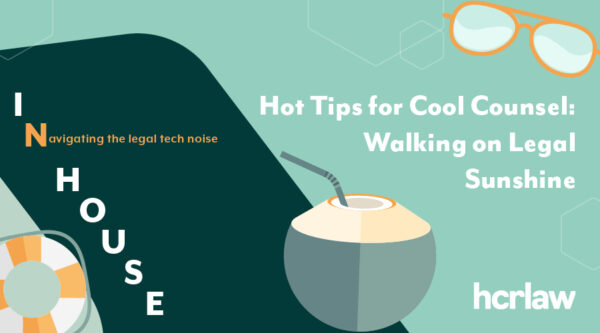
Securities and governance: Navigating corporate legal responsibilities
2 July 2025

This summer, the In-House With You team at HCR Law is ‘walking on legal sunshine’ with Hot Tips for Cool Counsel, a seven-part article series created especially for in-house lawyers. Whether you’re planning ahead or tackling new challenges, these summer legal essentials offer a seasonal refresh with practical tips and insights, to help you stay sharp, compliant, and confident, whatever the summer brings.
In this penultimate issue in the series, Helen Higginbotham, Corporate Partner and Head of BRICS, considers corporate legal responsibilities and shares key considerations related to corporate governance, shareholder rights, and securities compliance for publicly traded companies.
As the UK corporate landscape grows under increasing regulatory scrutiny, in-house legal teams face mounting pressure to pre-empt legal and governance risks. From Companies House reforms to internal policy hygiene, 2025 is shaping up to be a year when staying ahead of the curve is key!
Here are three areas that every in-house legal department should prioritise as we move through the second half of the year.
1. Companies House ID verification: Be prepared for mandatory checks
In accordance with the Economic Crime and Corporate Transparency Act 2023 (ECCT Act), Companies House will soon require mandatory ID verification for:
- All directors
- People with Significant Control (PSCs)
- Anyone filing information or acting on a company’s behalf, including Authorised Corporate Service Providers (ACSPs).
The government has said that over six million individuals will need to comply during the first 12 months of implementation with a phased rollout designed to ease the burden on companies. A voluntary window is now open, and those affected are encouraged to act soon.
“To save time later, we encourage directors, people with significant control of companies (PSCs) and those filing information with Companies House to verify their identity during the voluntary window,” said Louise Smyth, CEO of Companies House.
How to verify identity:
- Submit a UK passport, driving licence, residence permit or Frontier Worker permit via Companies House online
- Or go through an ACSP, such as a solicitor or accountant regulated for anti-money laundering (AML) compliance.
For existing directors, verification will be included into the annual confirmation statement process. These changes are part of wider efforts to increase transparency and reduce economic crime.
Important note:
Failure to complete ID verification by the deadline could result in a prohibition from acting as a director. However, once a director’s identity has been verified for one company, they will not need to repeat the process for each company they are associated with.
2. Sole directors and model articles: Clarify authority before it’s challenged
Model articles of association have been the legal default for UK companies since 2009. Designed to simplify company formation, they offer a ready-made governance framework. However, a conflict within the model articles themselves has created legal ambiguity for companies with sole directors.
The legal contradiction has been that Article 7(2) says a sole director may make decisions alone if the company has only one director whereas, Article 11(2) states that the quorum for board meetings is never less than two.
This inconsistency came to light in 2022 when two High Court cases reached opposing conclusions:
- Hashmi v Lorimer-Wing (Fore Fitness), the Court ruled that a sole director under model articles could not act alone
- Re Active Wear Ltd, a different Judge ruled the opposite, finding that the sole director could act validly; and
- KRF Services (UK) Ltd [2024] EWHC 2978 (Ch): The Court reaffirmed the reasoning in Active Wear, fully clarifying the issue. It held that where a company has adopted the model articles without modification, a sole director can validly exercise all director powers, regardless of whether the company previously had multiple directors. The judge rejected earlier obiter comments suggesting that a history of multiple directors could invalidate sole director actions.
Because both are High Court cases, neither is binding over the other which left the law in an unsettled state.
It is important for the article provisions relating to quorum to be clear to avoid future disputes. We therefore recommend that model articles of association are amended to remove ambiguous drafting.
3. Mid-year governance review: Stay ahead of key reforms
The new Audit Reform and Corporate Governance Bill will give the new regulator, Auditing Reporting and Governance Authority (ARGA), controls to sanction directors for serious failures for PLCs. The updated UK Corporate Governance Code increases board responsibility for risk and controls, effective for accounting periods from January 2025. The updated Code increases board responsibility for risk management and internal controls with a new assurance declaration expected to be introduced in 2027.
Good housekeeping necessitates regular review of governance policies, risk registers and board reviews, and should be part of every company’s annual review.
To read more in the ‘Hot Tips for Cool Counsel’ series click here.




